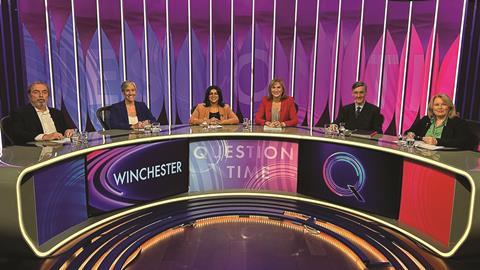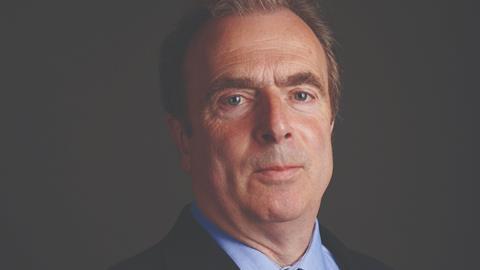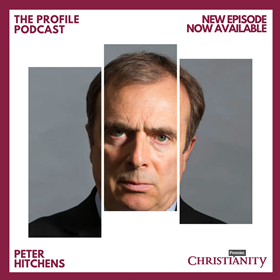The opinionated, and often divisive, journalist on how he talked himself out of faith…and then back into it
The hated Peter Hitchens (I’m not being rude – it’s a phrase coined by his own family and inspired by common caricatures of him) arrives at Premier Christianity’s offices looking a little world-weary. When I greet him with a breezy: “Good morning”, he replies (with a grunt): “It’s too early to tell.”
The encounter is symptomatic of what follows, as my attempts to cheer him up fail dramatically. Hitchens is equal parts grumpy and witty. There’s an endearing charm to him, and he often makes me laugh during our interview. As he’ll soon tell me: “Pessimism is a very humorous attitude towards the world.”
The Mail on Sunday columnist is employed to be opinionated and direct (“Name one thing the Conservative party has done that’s conservative?” he demands at one point). His career has included public arguments on TV programmes such as Question Time and Newsnight, where he’s debated the rights and wrongs of illegal drugs policy, Covid vaccines and the EU. Maybe he’s unaccustomed to a friendlier questioner like me; his mood permanently stuck on ‘defensive’.
For all his foibles, there’s something refreshing about Hitchens. And you never quite know what he’s going to say next. He’s a free thinker, and while he describes his own back-and-forth journey to Christian faith as “clichéd”, I disagree. How many teenagers do you know who tried to burn their Bible?
Your Christian upbringing came through your school more than your parents, didn’t it?
Completely. We were given lessons in the Bible, we had religious services at the beginning of the day and short prayers at the end. We would sing hymns daily. These are tremendously powerful ways of instilling in you a certain way of looking at the universe, which I’ve never really lost.
Do you wish these religious elements of schooling were more prevalent today?
You could wish it if you wanted to, but it would be futile.
Having hymns such as ‘Immortal, invisible, God only wise’ as the background music of your life would, in many ways, be better for you than the sort of rubbish which now seeps out of our radios and televisions.
Like many teenagers, you left your faith behind and became an atheist.
It’s such a cliché. Anybody who doesn’t go through this moment of: Perhaps all this is rubbish seems to me to not have been paying attention.
You’re bound to go through this. And then you grow up and realise that, actually, you hadn’t been quite so clever in your teens as you’d thought.
I’ve read a story about you, aged 15, burning a Bible…
I tried to burn it, but it’s surprisingly hard to do.
So what happened?
Well, I was showing off.
It sounds like you were having a strong rebellion against the Christian faith.
No, a ‘strong rebellion’ is where you risk getting your head blown off. I wasn’t taking any material risk. A lot of so-called ‘rebellion’ is just riskless posturing.
I love being a pessimist and I think I’m quite good at it
So, was abandoning your Christian faith not well thought-out?
It was reasonably well thought-out. It was based on a desire to be entirely commanded by myself. The first and only command of atheism is: ‘do what thou wilt’, which meshes very well with the modern belief in personal autonomy – no one can tell me what to do with my own body. Atheism is very liberating, if that’s what you want to do.
What brought you back to faith?
It’s another set of boring clichés. I got married and had children. It’s both extremely obvious and deeply personal. So I don’t discuss it.
But you must have some kind of explanation as to what prompted your return to faith?
Both of them [Christianity and atheism] are opinions, which you arrive at by reason…

Was it logic and reason that brought you back?
The choice of belief is driven by desire. When I was a selfish teenager, I desired to believe things which suited me. I later discovered that it was actually impossible to be that person anymore, and it rather revolted me anyway. So I reasoned myself, through my desires, into a belief that the universe is created, designed and purposeful, and that what I do here matters. That suits me now.
It’s an interesting admission, that Christian faith ‘suits’ you. You didn’t say you were intellectually convinced of the arguments for belief.
I just tell the truth about these things. There’s no point in pretending otherwise. I chose it because I prefer it.
But presumably, as a Christian, your faith is also based on truth – such as the objective existence of God?
I can’t objectively prove the existence of God. The default position of the thinking person on these things has to be agnosticism. You will not get beyond agnosticism if you don’t desire to. The atheist desires furiously for there to be no God, and is terrified by the idea that the universe has a purpose. The believer has the opposite reaction.
I’m fascinated by the role of reason in your conversion.
Well, I thought myself out of it and then I thought myself back into it.
So, what are the strongest arguments for Christianity?
It’s the old Immanuel Kant [quote]. It’s the stars burning in the sky and the conscience burning within. Conscience is a very hard thing to explain if there is no God, and the universe is a very hard thing to explain – why is there something rather than nothing?
The atheist finds the idea that this is a designed universe repulsive for various reasons. We can guess what those are. If you’ve been as wicked as I have in my life, that’s not very hard. You don’t want there to be justice in the universe.
You describe yourself as ‘wicked’?
Oh, absolutely – many people think I’m still a terrible person, and who am I to dispute it? But by comparison, I was much worse before.
What did you do?
I’m not telling you.
Why not?
Because it’s none of your business and it wouldn’t just embarrass me – which is becoming increasingly difficult to do as I get older – but would embarrass other people.
Is it fair to say you’re more comfortable talking about topics like politics than you are your own personal life?
Isn’t everybody?
The most persuasive vision of hell that I ever heard is being rotated slowly on a spit while videos are played in front of all your enemies of all the stupid things you ever did, for all eternity.
I remember the embarrassing and stupid things I’ve done. They might be 40 years ago, but I still wince at the memory. The confession in the Prayer Book service of the Lord’s Supper says: “The burden of them is intolerable. The remembrance of them is grievous unto us.” This grows more so as events get further away. You realise there’s no possibility of undoing them and, therefore, without divine grace you really are completely done for.
Since coming back to faith, what have been your biggest doubts?
The simple doubt of whether it is all true or not.
Is that a regular feeling?
Occasionally one has it. There are certain bits of holy writ to which I think: Crikey, this is stretching it a bit. Not sure I can really subscribe to that. I find the book of Revelation pretty hard to take. And some parts of Acts.
Of course, anyone who thinks, will doubt. If you say you don’t, you’re incredibly incurious or not telling the truth. Apart from anything else, where is the enemy going to concentrate his action, except at the heart of belief?
What church do you go to?
I attend a church in Oxford, which is more or less the traditional, broad Anglican type.
What is extremely important to me is that the 1662 Book [of Common Prayer] and Authorised Version [of the Bible] are used, because I think truth is beauty and beauty is truth.
The Church of England’s vandalisation of its own scripture and prayers over the past 60 years has been a grotesque mistake, and has driven many people away from the faith. If you go to church, it ought to be beautiful.
Not everyone finds beauty in the same thing, though.
I disagree. I think there’s an absolute in beauty.
I defy anybody to say the paintings of Vermeer are not beautiful. Or the language of the Authorised Version of the Bible. It means so much more than the flat paraphrases which are nowadays offered in their place. And they’re much more powerful when spoken aloud, which is important in church, and much more memorable. All these things are objective measures of their beauty.
Can there be an objective measure of beauty?
Yes. Because beauty originates in truth, and truth originates in God.
You said earlier you can’t objectively prove the existence of God. And yet you do think there’s an objective measure of beauty?
I think one of the things which suggests the existence of God is the existence of beauty.
What do you make of the Church of England’s debate over sexuality and offering prayer for same-sex couples?
I ignore it completely. It’s an elephant trap, designed to make conservatives look like bigots.
Far more important is the fact that the Church abandoned its defence of heterosexual marriage in the 1960s. The pandemic of divorce, followed by the growing epidemic of people who’ve never got married in the first place, is so much more important than this.
Powerful moral rules shouldn’t be cast aside lightly because, then, something which has been maintained and constructed over two millennia can be destroyed in an afternoon, and is then very hard to reconstruct. If the Church isn’t going to stand up for lifelong marriage, which is written into its own scripture and liturgy, who else is?
Speaking of marriage, am I right in thinking you’re celebrating a big anniversary this year?
I don’t know.
From what I’ve read you’ve been married a long time and…
We’re not discussing these things.
But the reason I bring it up is that we’re talking about marriage and…
But I’m not a minister of religion, I’m not an exemplar, and…
Please let me ask the question, then you can decide whether or not to answer it. I just wanted to know what you’ve learned about yourself during your years of marriage?
When I was a junior reporter back in the 1970s, one of my duties was to go out and interview people who were celebrating their golden wedding [anniversaries]. The question I always asked was: “How have you managed to stay together for so long?” And they would always say: “Give and take.” I’ve learned they were right.
So you can answer a personal question after all!
I didn’t answer a personal question. I told you what people told me in the 1970s in Swindon.
But you think they were right?
I think they were right. I thought at the time was a cliché. Now I know it’s a cliché because it’s true.
You have famously changed your mind on a whole host of issues; you were formerly a Trotskyite fighting for the socialist revolution, for example. In the world of politics, when people announce they’ve changed their minds, they’re accused of U-turning and it’s seen negatively, isn’t it?
Yes, one of the things you rapidly discover is no one will ever applaud you for changing your mind. Most people regard it as a betrayal. You will lose friends and you’ll be punished for it in various ways.
You’re speaking from experience?
Yes. I don’t regret it, but it’s undoubtedly the case that if you seriously change your mind, it changes your life. And it doesn’t necessarily make it nicer.
Is it painful when people disagree with you to that extent?
I have thick skin. If you want to be rude to me about my opinions, feel free.
You once described yourself as an Olympic-standard pessimist. Is that something you take pleasure in?
Pessimism is one of the great pleasures of life. I love being a pessimist and I think I’m quite good at it.
My favourite character in English literature is Eeyore [from AA Milne’s Winnie the Pooh].
I’m accused all the time of having no sense of humour. But I tend to think pessimism is a very humorous attitude towards the world. I’m not the kind of person who sits there saying: “How wonderful!” all the time. But who would want to be that person?
I think some people do want to be that person.
Pessimism is the key to happiness. You’re never disappointed. I really don’t see why everybody doesn’t adopt it.
But what about all those Bible verses such as “the joy of the Lord is your strength” [Nehemiah 8:10], or “the fruit of the Spirit is…joy” [Galatians 5:22]?
What’s that got to do with the fact that my train is 45 minutes late yet again?
To hear the full interview listen to Premier Christian Radio at 8pm on Saturday 8 July or download ‘The Profile’ podcast







































No comments yet